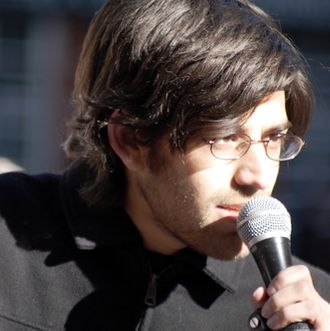
In addition to a massive outpouring of grief, the suicide of Reddit co-founder, programmer, and Internet activist Aaron Swartz has prompted a great deal of anger among members of the online and tech communities who knew him best. Swartz was awaiting trial for using MIT’s wireless network to download 4.8 million academic documents from JSTOR (he had legal access to the online library as Harvard researcher at the time) with the apparent intention of distributing them for free. Many seem to believe that the strain of the case — which carried the threat of 35 years in prison and a $1 million fine — pushed the already depressed 26-year-old over the edge. Swartz’s family released a statement reading, “Aaron’s death is not simply a personal tragedy. It is the product of a criminal justice system rife with intimidation and prosecutorial overreach. Decisions made by officials in the Massachusetts U.S. Attorney’s office and at MIT contributed to his death. The US Attorney’s office pursued an exceptionally harsh array of charges, carrying potentially over 30 years in prison, to punish an alleged crime that had no victims.”
In the immediate wake of the news, Swartz’s friend and Creative Commons founder Lawrence Lessig wrote a blog post that also held federal prosecutors and their “absurd” charges more than partially responsible for the death. “The ‘property’ Aaron had ‘stolen,’ we were told, was worth ‘millions of dollars’ — with the hint, and then the suggestion, that his aim must have been to profit from his crime,” Lessig wrote. “But anyone who says that there is money to be made in a stash of ACADEMIC ARTICLES is either an idiot or a liar.” Indeed, researchers and academics have been tweeting links to free PDFs of their work as a tribute to Swartz.
Meanwhile, JSTOR — which declined to press charges against Swartz — also issued a statement: “The case is one that we ourselves had regretted being drawn into from the outset, since JSTOR’s mission is to foster widespread access to the world’s body of scholarly knowledge. At the same time, as one of the largest archives of scholarly literature in the world, we must be careful stewards of the information entrusted to us by the owners and creators of that content. To that end, Aaron returned the data he had in his possession and JSTOR settled any civil claims we might have had against him in June 2011.” JSTOR’s reluctance to participate in the federal case against Swartz has been cited by many as evidence of prosecutors’ unnecessary aggressiveness, as all thirteen of the felony counts against him relied in some part on the idea that he stole or damaged JSTOR property — as well as that of MIT, which never spoke out against the trial.
Alex Stamos, an Internet security veteran who served as the expert witness in Swartz’s case, offered his take on MIT’s role in the matter in a blog post of his own. Though Stamos was acting for Swartz’s side (though the two never met), he points out that he has frequently worked for the prosecution in online theft cases, including “capitalist-white-hat” efforts on behalf of Sony. Still, he writes that he had never seen a network as “extraordinarily open” as MIT’s. He adds that the Institute’s head of security admitted that the network was intentionally “unmonitored and unrestricted” in the “spirit of the MIT ethos,” and that the school “chooses not to prompt users of their wireless network with terms of use or a definition of abusive practices.” Like many, he also noted that JSTOR allowed users unlimited access materials, and that the application does nothing to restrict bulk downloaders or restrict “what they might consider abusive behavior.”
Stamos went on to compare the criminal implications of the case to “accessing an unlocked closet on an open campus, one which was also used to store personal effects by a homeless man,” and points out that trespassing charges against Swartz had been dropped. “If I had taken the stand as planned and had been asked by the prosecutor whether Aaron’s actions were ‘wrong,’” he writes, “I would probably have replied that what Aaron did would better be described as ‘inconsiderate’ … Like writing a check at the supermarket while a dozen people queue up behind you or to check out every book at the library needed for a History 101 paper.” While Swartz’s actions were likely a bit more significant than simply annoying his fellow shoppers, it seems safe to say that they added up to something less than 35 years behind bars.
Update: MIT plans to investigate its own role in Swartz’s prosecution, President L. Rafael Reif said in an open letter to the MIT community on Sunday. It reads, in part:
I have asked Professor Hal Abelson to lead a thorough analysis of MIT’s involvement from the time that we first perceived unusual activity on our network in fall 2010 up to the present. I have asked that this analysis describe the options MIT had and the decisions MIT made, in order to understand and to learn from the actions MIT took. I will share the report with the MIT community when I receive it.





























